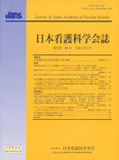Japanese
English
- 販売していません
- Abstract 文献概要
- 参考文献 Reference
- サイト内被引用 Cited by
要旨
目的:在宅で侵襲的人工呼吸療法を行う筋萎縮性側索硬化症(ALS)患者が困難に対応するために必須の対処資源である心の支えになる他者と喜び・楽しみの内容を把握し,これらと属性と病気・療養に関する特性との関連を解明するとともに,前向きに生きる力を表すHopeとの関連から意味づけを行うこと.
方法:面接調査の結果をもとに作成した質問紙を用いた無記名の郵送配票調査を実施し,121ケースを分析対象とした.HopeレベルはHerth Hope Index尺度を用いた.
結果:患者の9割が心の支えになる他者と何らかの喜び・楽しみを有していた.心の支えである他者が家族だけではなく医療・介護職者と友人・知人と支援者にまで及んでいたのは13%であり,喜び・楽しみが「身近で些細な癒されるもの・愛でるもの」だけではなく「人との関わり」と「ALS関連の情報収集」と「積極的な行動や活動」に及んでいたのは22%であった.これらを多領域にわたってもつ人ほどHopeは高かった.意思伝達装置のパソコンを利用する人で,心の支えになる他者や喜び・楽しみを多領域にわたって有していた.
結論:本研究では,これまで重要と言われてきた心の支えになる他者や楽しみといった対処資源が,身近なものを基盤として徐々に外に広がるという構造をもつこと,外部に広がるほどHopeが高いことが新たに明らかとなり,生活の質が高まる可能性が示唆された.患者への支援は,Hopeを維持し向上するという観点からも,これらの対処資源の維持・創出を目指すことが重要であり,社会とのつながりや意思伝達装置の利用が効果的である.
Abstract
Purpose: To provide a basis for improving hope, for amyotrophic lateral sclerosis patients who depend on tracheostomy invasive positive pressure ventilation during home health care, by investigating sources of psychological support and happiness as a coping resource. These factors followed by assessment of relationship to hope as an indicator of successful adaptation to the illness experience.
Method: Initial surveys were conducted from which we developed a questionnaire that was mailed to respondents and returned anonymously. We obtained valid responses from 121 subjects for the written survey to ascertain sources of psychological support and sources of happiness. The level of hope was assessed using the Herth Hope Index (HHI), which measures desire to live and meaningfulness of life.
Results: A majority of patients (90%) identified someone who provided psychological support or some source of happiness. Only 13% of patients reported help from both “family” and “medical staff or professional caregivers,” “friends or acquaintances” and other “supporters,” while 22% of patients described not only “environmental comforts,” but also “human interactions,” “learning information about ALS” and “activities.” Users of computer communication reported more sources of support and happiness. Patients describing more sources had higher levels of hope.
Conclusion: This research reveals that psychological support and happiness as coping resources are structured from near sources such as family to outside sources such as activities and patients describing more outside sources had higher levels of hope. These patients will be able to promote the quality of life. These results show that care should include providing these effective resources such as relating to the outside and using a computer. This approach has the potential to help patients recovering or promoting a life-sustaining sense of hope.
Copyright © 2009, Japan Academy of Nursing Science. All rights reserved.


